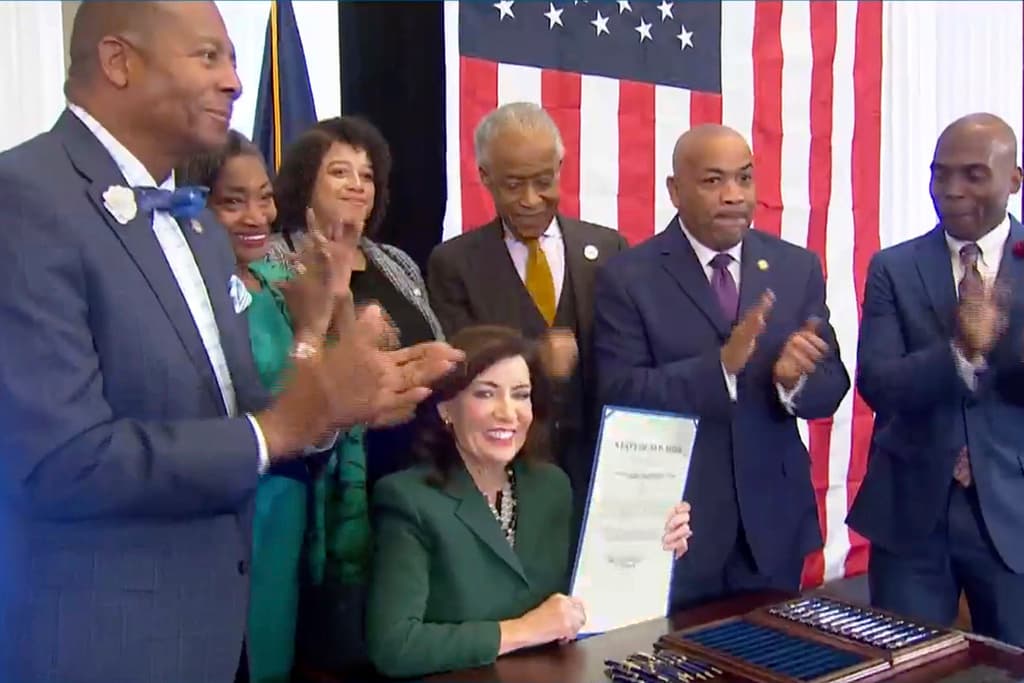Voters Deserve To Know If Harris Will Back Democrats Pushing for Race-Based Reparations
Instead of healing racial tensions, it threatens to raise false expectations of big payouts and provoke resentments.

New York’s City Council voted Thursday to launch a reparations task force, which could lead to calls for billions of dollars in taxpayer-funded payouts to compensate for the impact of slavery and past injustices.
Gotham joins dozens of municipalities, from Tulsa, Oklahoma, to Evanston, Illinois, as well as three states — California, Illinois, and most recently New York state — in considering race-based reparations.
The Democratic Party is pushing the idea. At one time, so did Vice President Harris.
As a candidate in the Democratic primary for president in 2019, she endorsed “some form of reparations,” cosponsored a federal bill to study race-based reparations, and promised the Reverend Al Sharpton’s National Action Network that as president she would sign a reparations study bill into law.
That was then. Now Ms. Harris’s campaign declines to say where she stands.
Does she want us to be “unburdened by what has been”?
Americans agree that slavery and Jim Crow were abhorrent parts of our nation’s past.
Yet this steamrolling movement for race-based reparations locally, statewide, and nationally is bad news.
Instead of healing racial tensions, it threatens to raise false expectations of big payouts and provoke resentments.
Reparations for actual victims are good. President Reagan established $20,000 payments for the Japanese Americans who were incarcerated by our government during World War II — but only for those imprisoned, not their descendants.
Similarly, the German government still pays reparations to Holocaust survivors but not to their descendants.
In contrast, American race reparations force people who had no part in slavery to hand over money to people who were not themselves enslaved.
As New York City Council member David Carr, who voted against a reparations task force, explained on X, “No one currently living in our city had anything to do with the evils of slavery & the vast majority of New Yorkers are descendants of immigrants who came after it was abolished.”
Reparations are divisive — and likely to cause real anger among those forced to pay. In America, we don’t punish people for the crimes of their ancestors.
Pew Research found that 80 percent of white Americans are opposed to the concept, while 77 percent of Black Americans support it.
“I’ll move before I’ll pay,” the City Council Minority Leader of New York, Joseph Borelli, said.
Race reparations also violate the U.S. Constitution’s 14th Amendment, which guarantees equal treatment of citizens regardless of race.
Evanston, Illinois, has paid out $5 million to 203 Black residents, supposedly to make up for historic housing discrimination. Anyone who is Black and resided at Evanston between 1919 and 1969, or had ancestors who did, is eligible — without having to prove they were actually wronged.
Judicial Watch, a constitutional advocacy group, is suing on behalf of six non-Black Evanston residents. The group’s president, Tom Fitton, calls the race-based payments “nothing more than a ploy to redistribute tax dollars to individuals based on race.”
That’s right. The goal isn’t to compensate actual victims of slavery and prejudice.
It’s social engineering — equity on steroids.
Reparations advocates Linda Bilmes and Cornell William Brooks of Harvard’s Kennedy School argue payments are needed to close the wealth gap between whites and Blacks.
Tulsa reparations advocates urge cash payments, because household income there is 75 percent higher for white residents.
Instead of a confiscatory reparations scheme, how about a jobs program?
In New York, New School professor Darrick Hamilton seemed to have the racial wealth gap in mind at the first meeting of the state’s Community Commission on Reparations.
“The gross inequities that exist today are not the result of inadequate people,” Mr. Hamilton declared.
In other words, New Yorkers, hold on to your wallets.
Closing the racial wealth gap by giving to others what is taken from some is not a legitimate role of government.
Moreover, there isn’t enough money in state and local coffers.
San Francisco’s reparations task force proposed a whopping one-time $5 million payment to each Black resident, expressly to erase wealth disparities. Mayor London Breed shut down the preposterous $100 billion effort.
Duke economist William Darity argues that because states and cities can’t afford the $12 trillion he estimates it would take to close the racial wealth gap nationally, Congress should do it.
The Democratic National Committee platform, adopted August 16, calls on Congress to enact a bill that would study federal reparations.
Would a President Harris sign a reparations bill into law? We need to know.
Creators.com

